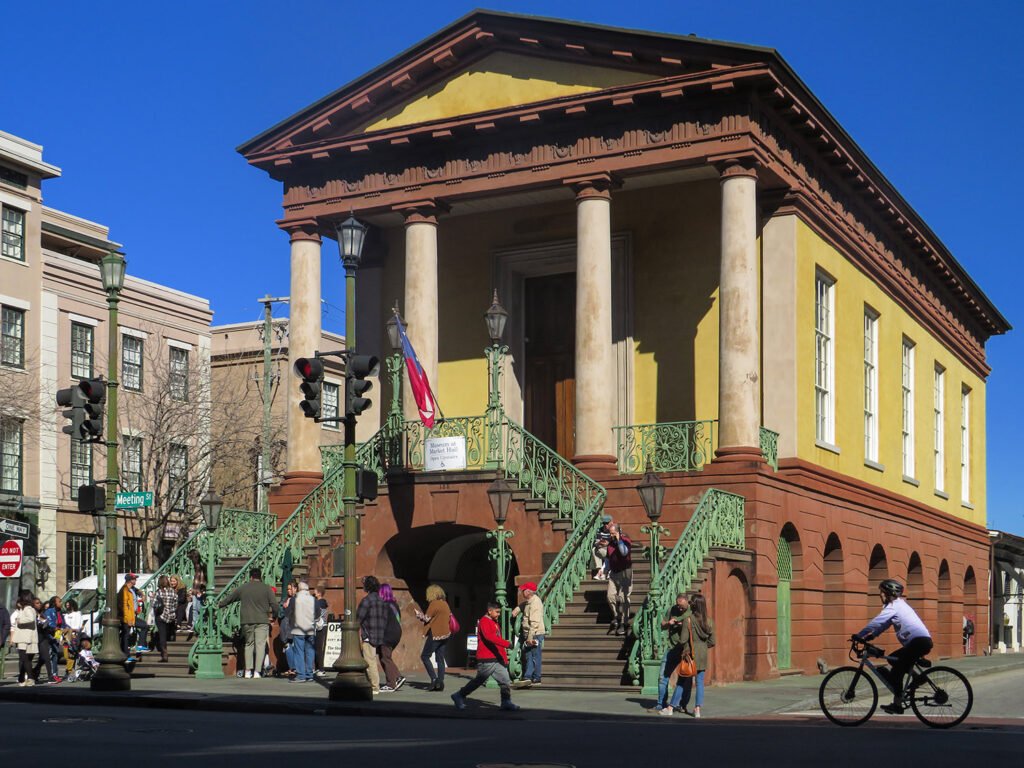
The Background
In August 1888, P.J. Moran, a member of the Atlanta city council, proposed an ordinance to establish central market houses owned and operated by the city, based on the public market house in Charleston, South Carolina3 4 (pictured above), which is still in operation.
G.L. Norrman was clearly in favor of the plan and expressed his thoughts for the August 23, 1888, edition of The Atlanta Constitution, in an article entitled “The Market Houses”. In typical Atlanta fashion, the council deliberated the idea for years,5 6 7 8 9 10 but took no serious action, and the plan eventually fizzled out.
In 1892, a central market designed by Bruce & Morgan of Atlanta was announced with great fanfare,11 12 but the plans were quickly abandoned when the city council refused to grant the owners’ request for a 15-year protection agreement that would prohibit similar markets from operating in the city.13 14
It wouldn’t have made any difference, because Atlanta had no such markets until the 1924 opening of the Municipal Market (later Sweet Auburn Curb Market).15 16 So much for it being a progressive city.
Norrman’s remarks:
“I am very much interested in the market house project started by Councilman Moran. I have given the matter a good deal of study. My idea is that the markets should be erected between Peachtree and Broad Streets, in the rear of the National hotel. This space is not occupied at present and it probably could be purchased by the city at a cheap figure. But if it is not practicable to get this, let the city have one markethouse for south Atlanta and one for north Atlanta. Just where they should be located I cannot say, but they ought to be in convenient localities. Atlanta should lose no time in abolishing the many meat stores which are to be found in nearly every street. It is a wonder that they have not bred disease long ago. In these stores are all sorts of perishable articles which are permitted to decay. The city needs nothing so badly as it needs adequate market houses. I trust that the ordinance introduced by Mr. Moran will be carried into effect.”17
References
- “Proceedings of Council.” The Charleston Mercury (Charleston, South Carolina), June 5, 1840, p. 2. ↩︎
- “The New Market.” The Charleston Courier (Charleston, South Carolina), January 4, 1841, p. 2. ↩︎
- “A Dull Meeting”. The Atlanta Constitution, August 7, 1888, p. 5. ↩︎
- “Market Houses.” The Atlanta Constitution, August 21, 1888, p. 8. ↩︎
- “The Market Problem”. The Atlanta Constitution, December 16, 1888, p. 26. ↩︎
- “The Chances Are Slim”. The Atlanta Journal, February 15, 1889, p. 1. ↩︎
- “The Market House.” The Atlanta Constitution, February 24, 1889, p. 12. ↩︎
- “Shall We Have a Market House?” The Atlanta Journal, February 25, 1889, p. 3. ↩︎
- “About the City Hall.” The Atlanta Constitution, March 23, 1889, p. 7. ↩︎
- “The Market House.” The Atlanta Journal, August 1, 1890, p. 3. ↩︎
- “The Market Building.” The Atlanta Journal, February 9, 1892, p. 3. ↩︎
- “Atlanta’s New Market.” The Atlanta Constitution, February 24, 1892, p. 5. ↩︎
- “Work of Council.” The Atlanta Journal, March 8, 1892, p. 2. ↩︎
- “No Market for Atlanta.” The Atlanta Constitution, March 23, 1892, p. 1. ↩︎
- “Big Crowds Attend Opening Of New Municipal Market.” The Atlanta Constitution, May 4, 1924, p. 8. ↩︎
- “Busy Scenes Mark Opening Of Local Municipal Market”. The Atlanta Journal, May 4, 1924, p. A11. ↩︎
- “The Market Houses.” The Atlanta Constitution, August 23, 1888, p. 8. ↩︎